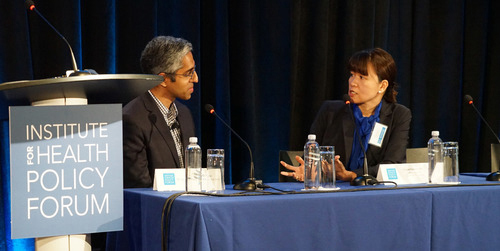Nolan Chang, MD, shares ways Kaiser Permanente is using AI to better the patient experience and reduce physician burnout.

Former U.S. Surgeon General Vivek Murthy, MD, (left) and Imelda Dacones, president and CEO of Northwest Permanente, discuss the effects of adverse childhood experiences during a Institute for Health Policy forum in Washington, DC.
Imelda Dacones, MD, and Former U.S. Surgeon General Vivek Murthy, MD, Address Trauma in Children
At the Kaiser Permanente Institute for Health Policy’s “Addressing Trauma in School-Aged Children” Forum last week, former U.S. Surgeon General Vivek Murthy, MD, and Northwest Permanente President and CEO Imelda Dacones, MD, shared perspectives on why addressing trauma in school-aged children is so critical for the health of families, schools, and communities.
Adverse childhood experiences (ACEs) include events such as abuse, neglect, and household dysfunction such as domestic violence, mental health illness in the family, and loss of a parent. Research shows children who live with and face four or more such experiences, said Dr. Dacones, “are four times likely to suffer from depression in their lifetimes, eight times more likely to become alcoholics, and 20 times more likely to use IV drugs, just to name a few chronic conditions and illness they will face as adults.”
The Institute for Health Policy sponsored the event as part of its mission to shape policy and practice with evidence and experience from Kaiser Permanente, the nation’s largest private integrated health care delivery organization. The forum at Kaiser Permanente’s Center for Total Health in Washington, DC, included other speakers such as Don Mordecai, MD, Kaiser Permanente’s national leader for mental health and wellness.
Dr. Dacones said the life expectancy for children who experience or live with trauma is as many as 20 years shorter – “cut short by diabetes, heart attacks, cancer, all because of the burden from adverse childhood experiences.”
Citing the research, she said it is critical to look much earlier in people’s lives – as children – to intervene and prevent chronic illness.
That sentiment was echoed by Dr. Murthy, who suggested organizations and legislators reconsider where to allocate resources. “As a society where we perhaps have erred, is it’s possible we go too far downstream in trying to carve up the (funding) pie,” he said. “We have to also think about how to fund upstream initiatives that will actually collectively reduce the likelihood of breast cancer, heart disease and substance use disorders.”
Watch the following video to view the panel discussion.


